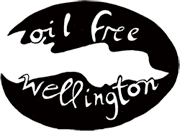The Green Market – by James Barber
Just before the 2008 election Ian Wishart’s reputably reprehensible Investigate Magazine ran an article about “The Reds inside the Greens”. Referring to the Greens as The Watermelon Party the article went on at length about the radical pasts of the now Co-leaders Russel Norman and Metiria Turei. Russel was once a member of a socialist organisation in Australia and Metiria has a history of fighting for the rights of beneficiaries and the satirical McGuillicuddy Serious Party.
However, looking at the Party today you would be forgiven for thinking it’s a different crowd entirely. Their latest policy announcement has received a favourable response from Right wing pundit David Farrar and the Tax Payers’ Union. The Green Party seem to be finally living up to the (almost satirical) slogan of “neither left, nor right, but out in front”. With The Civilian Party’s Up and Down of the political spectrum all of these directions are making political partisanship very confusing.
The New Carbon Tax
It is great that the Green Party has a strong stance on mining, drilling, and fracking. Similarly, it’s great that they’re putting climate change on the political agenda with their carbon tax. The withdrawal of their support for an emissions trading scheme (ETS) is a huge relief. The current ETS has subsidised polluters, increased the cost of living, and has done nothing to address greenhouse gas emissions. The Labour Party’s ETS, introduced with Green Party support in 2008, was similarly pointless. Trading schemes around the world seem to act as a money-go-round for businesses rather than a real solution to climate change. This will be discussed in more detail in another post.
The proposed carbon tax puts a price on carbon of $25 per tonne. The agriculture sector will pay a reduced rate of $12.50 per tonne. This tax has also been met with a tax cut. The first $2,000 of every individual’s earnings will be tax free and the business tax rate will be dropped by 1% (this follows the Green Party’s opposition to reducing the Business Tax rate in 2010). While Oil Free Wellington doesn’t think a carbon tax is the right way to address climate change, the Green’s carbon tax should not give the agriculture sector special treatment. Unsurprisingly, Federated Farmers’ Bruce Willis opposes the carbon tax saying that it would make farming “uncompetitive”. He may be correct, if so that’s great. There would be fewer emissions, dairy intensification would be halted, the corporate giant of Fonterra would be weakened, and there would be less shit in the rivers of Aotearoa.
Also the Green’s cutting the business tax rate seems contradictory. The Party seems to want to take from businesses with one hand and give back with the other. A carbon tax should be additional to the current business tax rate not accompanied by a tax cut.
While the carbon tax would be funding a tax free threshold of $2,000 the Green’s still have a tax free threshold of $10,000 as part of their economic policy. Hopefully this will be retained as Otago University Lecturer Bryce Edwards has describing scrapping this policy a “major shift to the right” and “removing what had been the Green’s most progressive policy for dealing with economic inequality”.
Perhaps the strongest critique of the carbon tax is the ideology underpinning it. It’s a market based solution which buys into the idea of setting a price and letting the invisible hand of rationally acting consumers save the world. This tax would put a price on carbon but it would still allow these industries to continue creating profit for the few at the expense of everyone else.
We believe that the best approach to reducing the greenhouse gas emissions of Aotearoa is to keep the coal, gas, and oil, in the hole. This is why we’ll be constantly campaigning against the ongoing exploration for fossil fuels in this country.
The Green Investment Bank
The carbon tax policy is not by itself. It operates in conjunction with another major policy announcement. Recently the Greens announced plans for a Green Investment Bank. This would be an independent, for profit, bank which would secure finances for what Russel Norman has described as “smart green innovation”. He says it would “combine the best of the public and private sectors to accelerate New Zealand’s transition to a smarter, greener economy”. Ironically the $120 million used to establish this would come from oil royalties. This policy accepts ongoing oil extraction and then uses the money raised to give private businesses the chance to make money in a more tasteful sector. If fossil fuel extraction continues, the money raised should go to those affected and our most in need. It shouldn’t go towards making private profit. While this “smart green innovation” may be sustainable that doesn’t mean that it is just or fair. If the Government wants to create “Green Jobs” for former fossil fuel workers then it should create state-owned forms of this “green innovation” or better yet community owned ones.
System Change Not Climate Change
The current Green Party seems to want to save the planet using the profit motive of capitalism. However, it is the profit motive and the drive for economic growth which brought us to this brink of ecological collapse. We need to find a just solution to climate change and tinkering with a system which caused it, among many other social and economic problems, is not the way forward.
